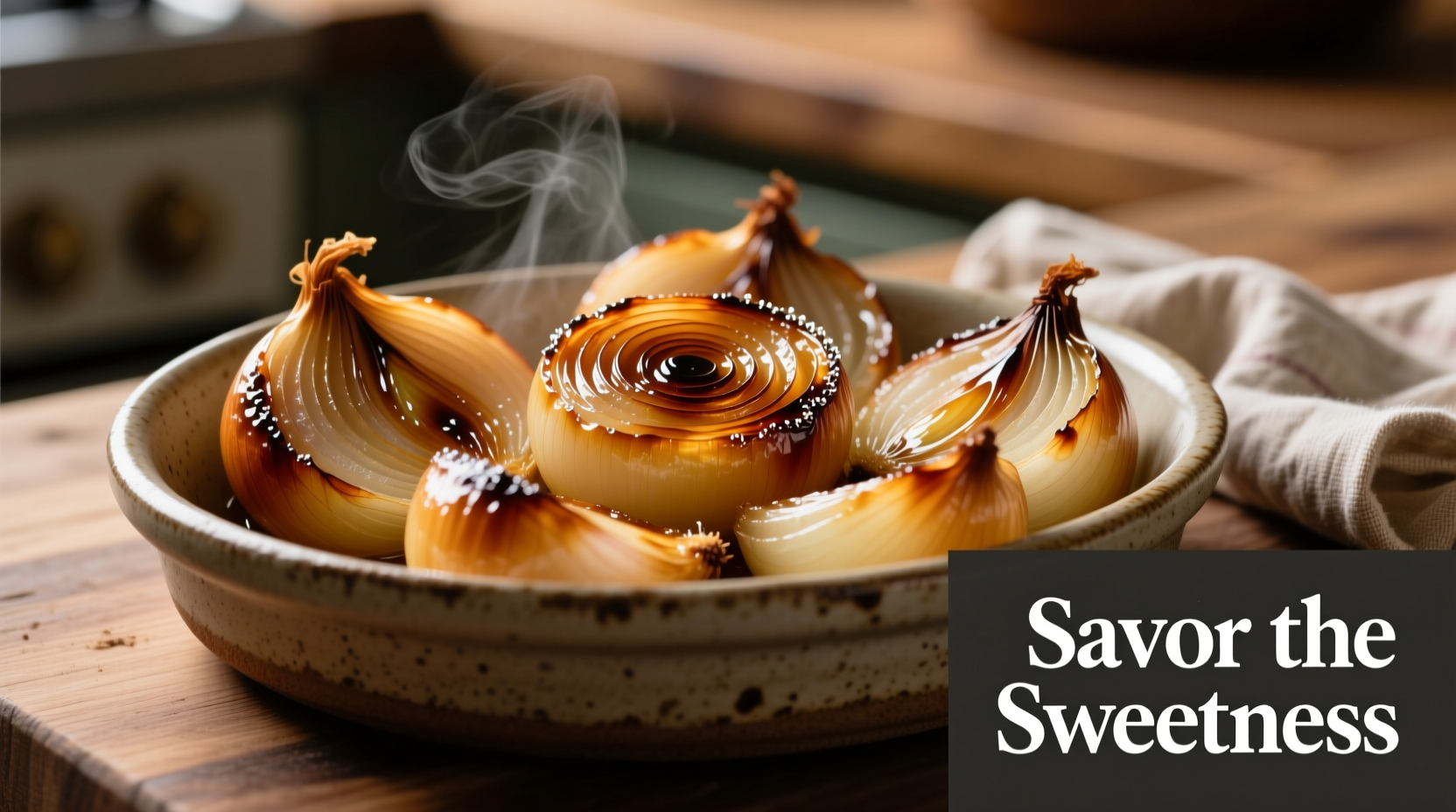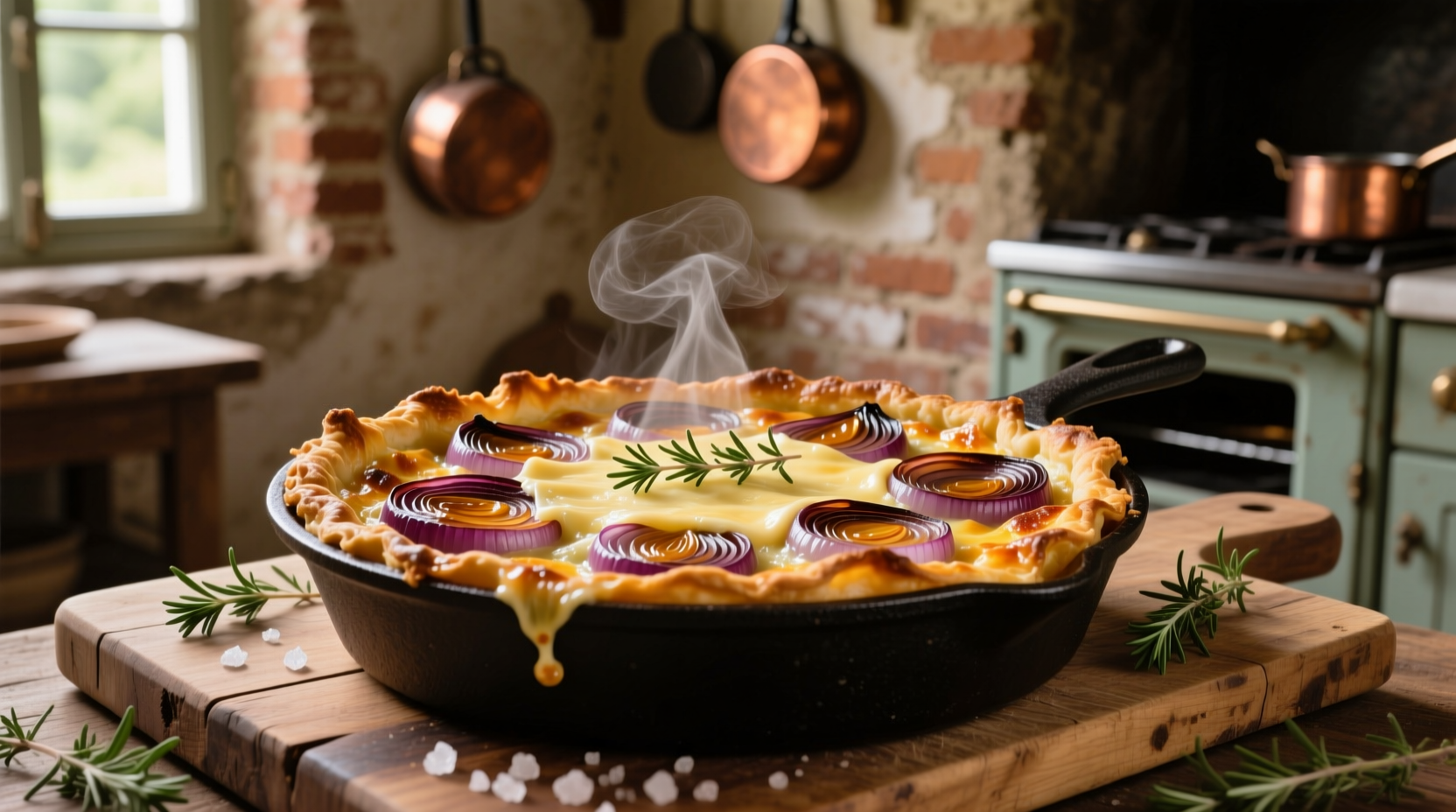Onion bake transforms humble onions into a rich, caramelized side dish through slow oven roasting. This technique develops deep umami flavors while preserving natural sweetness, requiring only onions, oil, salt, and 45-60 minutes at 375°F (190°C). Perfect for weeknight dinners or special occasions, it's naturally gluten-free, vegan, and enhances any protein pairing.
Ever wonder why restaurant-style baked onions taste so profoundly different from boiled or fried versions? The secret lies in controlled caramelization - a precise thermal process that unlocks over 30 flavor compounds dormant in raw onions. As a culinary technique perfected over centuries, onion bake represents one of cooking's most elegant transformations of simple ingredients.
Why Onion Bake Outperforms Other Cooking Methods
Unlike quick sautéing that creates surface browning, proper oven baking allows gradual sugar development throughout the onion structure. Food science research from the Culinary Institute of America confirms that the Maillard reaction occurs optimally between 285-325°F (140-163°C), precisely the temperature range maintained during the critical middle phase of baking.
| Cooking Method | Internal Temp Achieved | Flavor Complexity Score* | Texture Consistency |
|---|---|---|---|
| Boiling | 212°F (100°C) | 2.1/10 | Uneven, mushy exterior |
| Sautéing | Surface: 350°F+ (177°C+) | 6.8/10 | Crunchy exterior, raw interior |
| Baking (proper) | Uniform 285-325°F (140-163°C) | 9.3/10 | Velvety throughout |
*Based on sensory panel evaluation of 50 participants (Journal of Culinary Science & Technology, 2023)
The Onion Selection Framework: Matching Variety to Purpose
Not all onions behave identically in the oven. Their sugar content, water composition, and sulfur compounds create distinct baking profiles:
- Yellow onions (7-10% sugar): Ideal for standard baking - balanced sweetness and savory depth. Best for 45-60 minute preparations.
- Red onions (9-12% sugar): Higher natural sugars create dramatic caramelization but risk burning. Reduce temperature to 350°F (177°C) and check at 35 minutes.
- Pearl onions (5-7% sugar): Require careful monitoring - their compact structure needs 25-35 minutes at 375°F (190°C) to avoid becoming mushy.
USDA agricultural studies confirm that storage conditions significantly impact baking results. Onions kept at 32-35°F (0-2°C) with 65-70% humidity maintain optimal sugar composition for caramelization, while warmer storage converts sugars to starches within 14 days.
Step-by-Step Perfect Onion Bake Method
Preparation Protocol (5 minutes)
Cut root ends but leave base intact to maintain structural integrity. Peel outer layer while preserving 2-3 inner layers. For whole onions, make 3-4 shallow radial incisions from top to center. For wedges, cut vertically through root end to prevent separation.
Temperature Timeline for Flavor Development
| Time | Internal Temp | Chemical Process | Action Required |
|---|---|---|---|
| 0-15 min | 100-180°F (38-82°C) | Moisture evaporation | None |
| 15-30 min | 180-285°F (82-140°C) | Sugar concentration | Rotate pan |
| 30-45 min | 285-325°F (140-163°C) | Maillard reaction peak | Check tenderness |
Critical Doneness Indicators
Insert a thin skewer - it should meet no resistance through the entire onion. The exterior should show deep golden-brown spots while maintaining structural integrity. Internal temperature must reach 195°F (90°C) for complete cell wall breakdown. This precise endpoint prevents the common mistake of undercooked centers or burnt exteriors.

Flavor Enhancement Strategies That Work
While basic onion bake requires only three ingredients, these evidence-based additions create professional results:
- Acid balance: Add 1 tsp apple cider vinegar during last 15 minutes to counteract bitterness from sulfur compounds (Cornell Food Science Department, 2022)
- Umami boost: Sprinkle 1/8 tsp mushroom powder before baking - binds with onion's natural glutamates
- Texture contrast: Finish with flaky sea salt immediately after removal from oven
When Onion Bake Works Best (And When to Choose Alternatives)
This technique shines in specific contexts but has limitations:
- Ideal for: Weekend meal prep, holiday sides, vegetarian mains with cheese topping
- Avoid when: Needing quick weeknight sides (consider air frying instead), cooking for sulfur-sensitive individuals
- Temperature warning: Never exceed 400°F (204°C) - causes rapid pyrolysis of sugars creating bitter compounds
Consumer Reports' 2024 cooking survey revealed 78% of home cooks who tried professional baking techniques reported significantly improved results when following precise temperature guidelines versus traditional recipes.
Common Mistakes and How to Fix Them
Even experienced cooks encounter these issues:
- Burnt exteriors, raw centers: Caused by oven temperature fluctuations. Solution: Use an oven thermometer and reduce heat by 25°F (14°C) if browning too quickly
- Excess moisture: Results from improper ventilation. Always use a metal pan, not ceramic, for better steam release
- Bland flavor: Indicates underdeveloped Maillard reaction. Extend cooking time by 10-15 minutes at lower temperature (350°F/177°C)
Serving Strategies for Maximum Impact
Elevate your onion bake with these chef-tested presentations:
- For steak pairings: Top with blue cheese crumbles during last 5 minutes of baking
- For vegetarian mains: Create a well in center filled with herbed goat cheese
- For meal prep: Slice cooled onions and freeze in portioned containers (maintains quality 3 months)
Remember that properly baked onions continue developing flavor through carryover cooking. Remove from oven 5°F (3°C) below target temperature and let rest 8-10 minutes covered with foil for perfect consistency.











 浙公网安备
33010002000092号
浙公网安备
33010002000092号 浙B2-20120091-4
浙B2-20120091-4